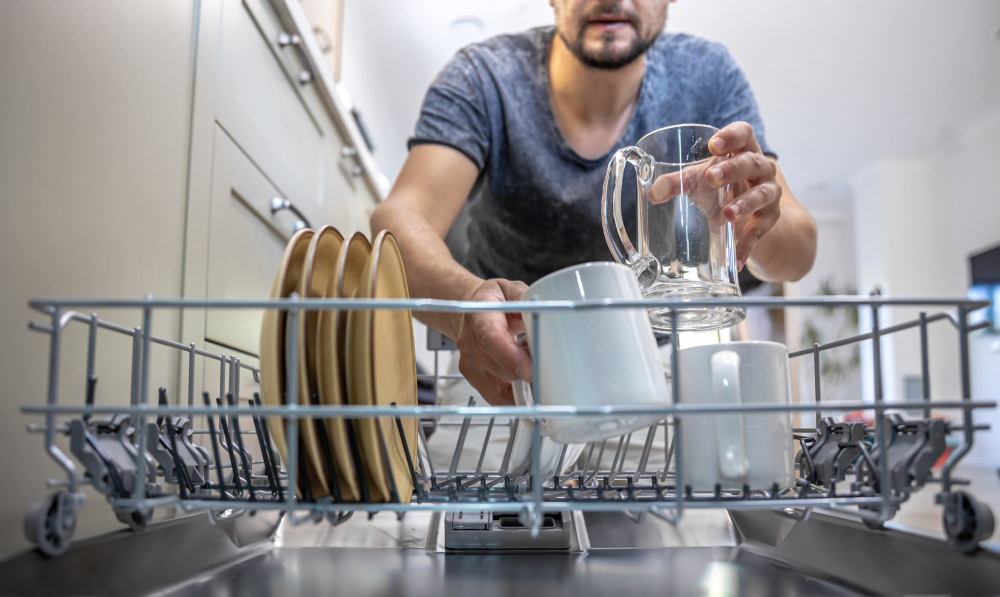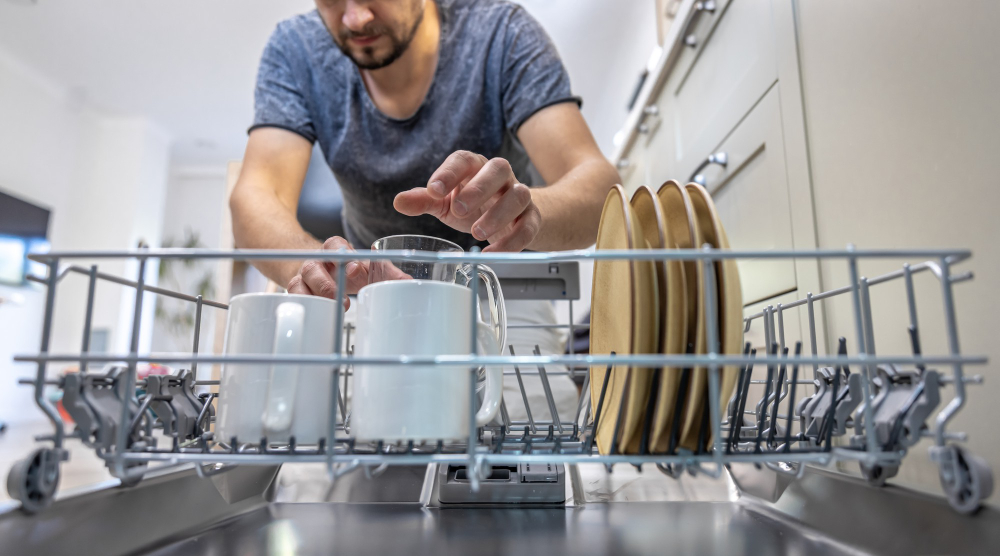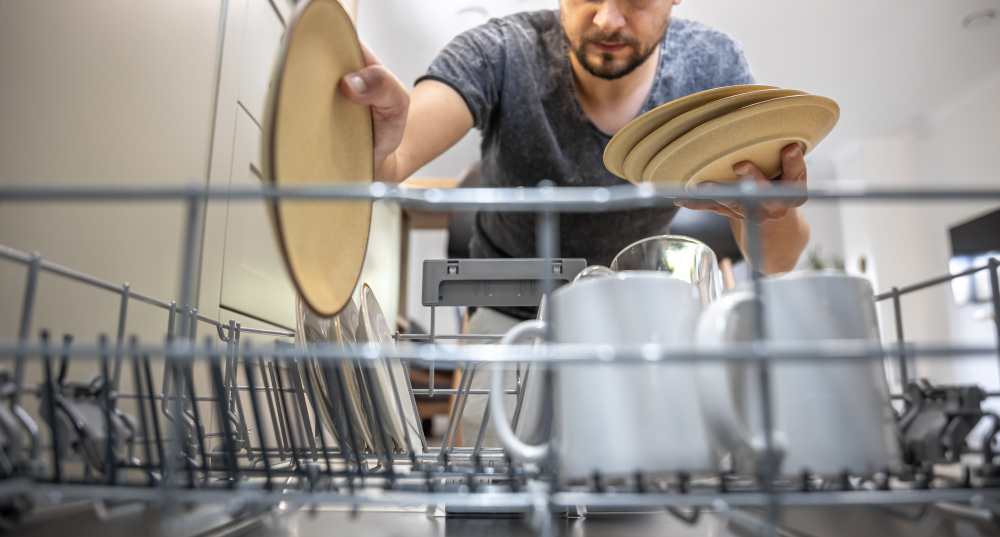
Dishwasher Tips and Tricks for Easier Dishwashing
Dishwashers have become indispensable kitchen appliances, saving us time and effort in the daily chore of washing up. However, to ensure their optimal performance and make dishwashing truly hassle-free, it's essential to understand some key tips and tricks. In this guide, we'll delve into various aspects of using your dishwasher efficiently and effectively.
Loading the Dishwasher Efficiently
One of the fundamental keys to effective dishwashing is loading your dishwasher efficiently. To maximise space and ensure proper water circulation, it's important to arrange your dishes strategically. Here's how:
- Place larger items like pots and pans on the sides or back of the dishwasher to avoid blocking the spray arm, which is responsible for the cleaning process.
- Position plates and bowls facing the spray arm for thorough cleaning. Overlapping or stacking dishes hinders the water and detergent from reaching every surface.
To Pre-Rinse or Not?
The age-old debate of pre-rinsing dishes before loading them into the dishwasher continues. However, modern dishwashers are equipped to handle some food residues efficiently, making pre-rinsing unnecessary for most cases. Here's why:
- Excessive pre-rinsing not only wastes water but also time and energy.
- Newer dishwasher models often come with sensors that detect soil levels and adjust the cleaning cycle accordingly, making pre-rinsing less critical.
Scrape vs. Rinse
To save even more time and water, consider scraping off food scraps from your dishes instead of thoroughly rinsing them. Here's how this simple change can benefit you:
- Scraping is usually sufficient to ensure your dishwasher can handle the rest.
- Rinsing dishes extensively before loading can be counterproductive, as dishwashers are designed to clean dirty dishes effectively.

Using the Right Dishwasher Detergent
Using the correct dishwasher detergent is crucial for achieving spotless and sanitised dishes. Consider these points when selecting your detergent:
- Always use the detergent recommended in your dishwasher's manual to prevent damage to the machine.
- Different types of detergents are available, such as pods for convenience, powder for cost-effectiveness, and liquid for versatility. Choose one that suits your preferences.
Loading Silverware and Utensils
Properly arranging silverware and utensils in the dishwasher is essential to ensure they get thoroughly cleaned and avoid issues like nesting:
- To prevent utensils from nesting, alternate the direction of their handles and place some pointing up and others pointing down.
- Use the utensil basket provided by your dishwasher and position knives with their blades down to prevent accidents.
Glassware and Delicate Items
Glassware and delicate items should be placed on the top rack to avoid breakage and ensure they remain in pristine condition:
- The top rack is designed to accommodate items that are more fragile, as they are further away from the powerful spray of water in the bottom rack.
- If you have dishwasher-safe racks specifically designed for wine glasses or stemware, use them to secure your glassware during the cycle.
Stacking Bowls and Plates
Efficiently stacking bowls and plates is essential to optimise space and cleaning. Follow these tips:
- Position bowls and plates so that they don't block the water flow from the spray arm.
- Allow some space between dishes to ensure they receive proper water and detergent coverage.

Proper Maintenance
Maintaining your dishwasher is vital for its longevity and performance. Here's a simple maintenance routine to follow:
- Regularly clean the dishwasher's filter, spray arms, and door gasket to prevent clogs and ensure efficient cleaning.
- Refer to your dishwasher's manual for specific instructions on how to access and clean these components.
Water Temperature and Energy Efficiency
Using hot water in your dishwashercan significantly improve cleaning and sanitisation while also saving energy. Consider these points:
- Ensure your dishwasher is connected to a hot water source, as using hot water from the start of the cycle is more effective.
- To save on energy costs, run your dishwasher during off-peak hours when electricity rates are lower.
Dishwasher Safe vs. Hand Wash Only
Knowing which items are dishwasher safe and which should be hand washed is crucial to avoid damaging your dishes. Here's what you need to consider:
- Check the manufacturer's guidelines and labels to identify dishwasher-safe items.
- Hand wash-only items may include delicate glassware, heirloom china, and certain cookware. Treat them with care to preserve their quality.
Using Rinse Aid
Rinse aid is an often-overlooked component that can greatly improve your dishwasher's performance and the overall cleanliness of your dishes:
- Rinse aid helps prevent water spots and streaks, facilitating better drying of your glassware and dishes.
- Invest in a high-quality rinse aid product and follow your dishwasher's instructions for the optimal dosage.
Organising the Dishwasher Routine
Establishing a routine for loading and unloading the dishwasher can help streamline the process and ensure that your dishes are always ready for use:
- Designate specific times for dishwasher duties, such as after dinner or before bed.
- Encourage all household members to participate in the routine to distribute the workload evenly.
Avoiding Common Mistakes
Recognising and correcting common loading mistakes is essential for optimal dishwasher performance. Here are some issues to watch out for:
- Overcrowding the dishwasher can obstruct water and detergent flow, leading to incomplete cleaning. Be mindful of the recommended load capacity.
- Improper positioning of dishes can result in inadequate cleaning. Ensure that dishes are arranged to allow for proper water and detergent coverage.
Hard Water and Dishwashers
Hard water can leave mineral deposits and stains on your dishes, making them appear cloudy or spotty. Combat hard water issues with these strategies:
- Consider installing a water softener to reduce the hardness of your water supply, which will prevent mineral build-up.
- Alternatively, you can periodically run an empty dishwasher cycle with white vinegar to remove mineral deposits.
Eco-Friendly Dishwashing
For environmentally-conscious individuals, there are ways to minimise your dishwasher's environmental impact:
- Choose eco-friendly dishwasher detergents that are biodegradable and phosphate-free.
- Run your dishwasher only when you have a full load to maximise water and energy efficiency. Utilise the delay start feature to time your cycles during off-peak hours.
Troubleshooting Dishwasher Issues
From time to time, you may encounter issues with your dishwasher. Here are some common problems and their solutions:
- If your dishwasher is clogged, clean the filters and check for any obstructions in the spray arms.
- Address leaks by examining the door gasket for damage or debris and replace it if necessary.
- To combat dishwasher odours, run a cycle with a cup of white vinegar or a dishwasher cleaner specifically designed to eliminate odours.

Safety Considerations
Safety should always be a priority when using a dishwasher, especially when handling sharp utensils or hot items:
- Exercise caution when loading and unloading knives to prevent accidents. Position knives with the blades facing down in the utensil basket.
- Keep dishwasher detergent out of reach of children, as it can be harmful if ingested.
Childproofing the Dishwasher
For households with young children, it's important to take extra precautions to ensure their safety around the dishwasher:
- Use child safety locks to secure the dishwasher door, preventing children from opening it during a cycle.
- Educate children about the potential dangers associated with the dishwasher and discourage them from playing with it.
Extending the Dishwasher Lifespan
Proper care and maintenance can significantly extend the lifespan of your dishwasher:
- Clean the interior of your dishwasher regularly to remove accumulated dirt and residue.
- For older machines, consider scheduling periodic professional servicing to ensure they continue to perform optimally.

Conclusion and Recap
In this comprehensive guide, we've covered a wide range of tips and tricks to make your dishwashing experience easier and more efficient. From loading the dishwasher correctly to addressing common issues and optimising energy usage, these strategies can help you get the most out of your dishwasher while saving you time and effort in the kitchen.
By following these guidelines and implementing the suggested practices, you'll enjoy cleaner, more hygienic dishes and extend the lifespan of your dishwasher. Here's to a future with fewer dishwashing woes and more time for the things you love!
Stay tuned for more informative guides and helpful tips from us. Happy dishwashing
Frequently Asked Questions
Do I need to pre-rinse my dishes before placing them in the dishwasher?
Pre-rinsing your dishes is generally unnecessary with modern dishwashers. Most newer models come equipped with sensors that can detect soil levels and adjust the cleaning cycle accordingly. However, you should scrape off any large food scraps to prevent clogs in the dishwasher's filter and spray arms. Excessive pre-rinsing not only wastes water but also energy, so it's often best to let your dishwasher do its job without pre-rinsing unless the dishes have dried-on, stubborn residue.
How can I prevent water spots and streaks on my glassware and dishes?
To prevent water spots and streaks, use a rinse aid in your dishwasher. Rinse aid helps water sheet off dishes, preventing the formation of spots. Ensure that your dishwasher's rinse aid dispenser is filled according to the manufacturer's recommendations. Also, consider using the "rinse and hold" or "air dry" feature if your dishwasher has them, as they can help with better drying.
What's the best type of dishwasher detergent to use: pods, powder, or liquid?
The choice of detergent depends on personal preference and your dishwasher's compatibility. Dishwasher pods are convenient and pre-measured, but they can be more expensive. Powder detergents are cost-effective and versatile, while liquid detergents can be used as a pre-soak for tough stains. It's important to use a detergent recommended by the dishwasher's manufacturer, as using the wrong type can lead to poor cleaning and potential damage.
Is it safe to load knives and sharp utensils in the dishwasher?
It is generally safe to load knives and sharp utensils in the dishwasher, but you should take precautions. Place knives with their blades facing down to prevent accidents during loading and unloading. Make sure that other items in the dishwasher won't shift and potentially expose the blades. If you have space, consider using the utensil basket for safe storage.
How do I address common dishwasher problems like clogs, leaks, and odours?
- Clogs: Regularly clean the dishwasher's filter, spray arms, and check for obstructions to prevent clogs. Run an empty cycle with white vinegar to remove mineral build-up.
- Leaks: Inspect the door gasket for damage or debris. Replace it if necessary. Ensure the dishwasher is level to prevent leaks.
- Odours: Clean the interior of the dishwasher, including the rubber door gasket and the filter. Run a cycle with white vinegar or use a dishwasher cleaner designed to eliminate odours.
What should I do to extend the lifespan of my dishwasher?
To extend your dishwasher's lifespan, follow these tips:
- Clean it regularly, paying attention to the filter, spray arms, and door gasket.
- Avoid overloading the dishwasher beyond its capacity.
- Use hot water for optimal cleaning and sanitisation.
- Address issues promptly to prevent damage from worsening.
- Consider professional servicing for older machines.
Are there any eco-friendly practices for using a dishwasher?
Yes, you can make your dishwashing routine more eco-friendly by:
- Choosing biodegradable and phosphate-free dishwasher detergents.
- Running the dishwasher with a full load to maximise water and energy efficiency.
- Using the delay start feature to run cycles during off-peak electricity hours.
Can I put delicate glassware and dishes in the dishwasher, or should I wash them by hand?
Whether you can put delicate items in the dishwasher depends on their specific care instructions. Always check the manufacturer's guidelines and labels. Some delicate items may be dishwasher-safe, while others, like heirloom china and fragile glassware, should be washed by hand to prevent damage.
What are the most common loading mistakes to avoid when using a dishwasher?
Common loading mistakes to avoid include:
- Overcrowding the dishwasher, which can hinder water and detergent flow.
- Improper positioning of dishes, preventing proper cleaning.
- Stacking dishes excessively, preventing water and detergent access.
